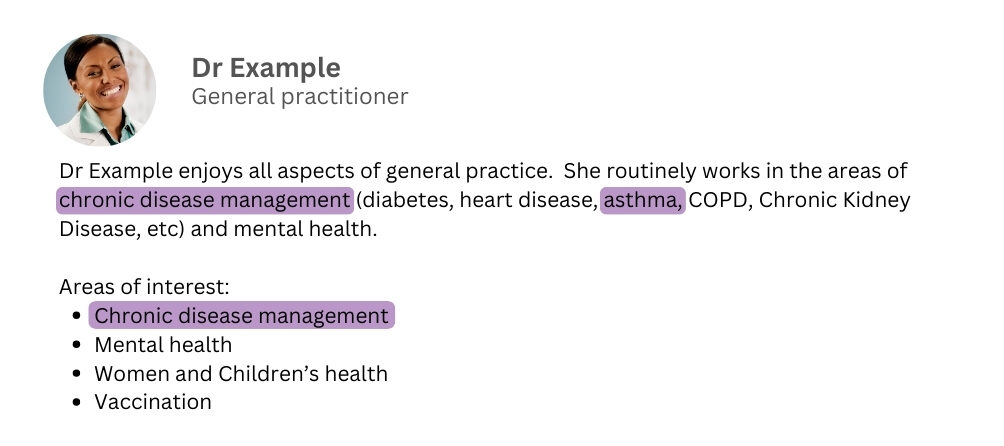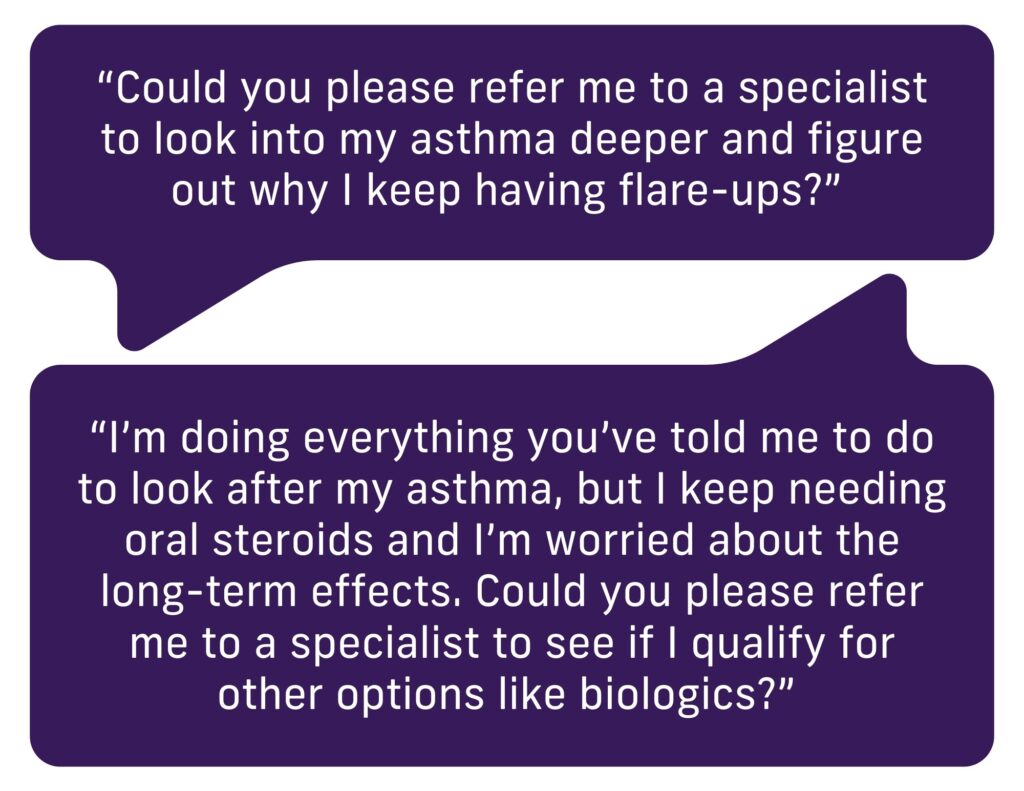Feeling like you’ve tried everything, but keep having flare-ups and needing oral steroids?
If you’re doing everything your doctor recommends and your asthma control isn’t excellent, it might be time to get a second opinion or referral to a specialist.
For most people with asthma, preventative treatments are available that can keep your asthma under control and prevent flare-ups and excessive steroid use. If you keep needing oral steroids to prevent going to hospital you put yourself at greater risk of long-term side effects. If you’re not sure you’re doing everything you can, check out our Asthma Basics page, or call us on 1800 ASTHMA to talk about the asthma essentials.
Option 1: Find a new doctor who knows asthma
Your GP or General Practitioner is a local doctor who knows about many health conditions. They are our medical system’s superstars! In Australia, we’re very lucky that most of us have a choice of who to pick as our doctor (This may not always be an option if you live rurally or remotely, although telehealth options are growing fast).
However, not every doctor has the same amount of knowledge about every issue. For instance, your current doctor might be the best one around for diabetes, but they might not be 100% up to date on new options in asthma care.
To find a doctor with an interest in, or extra experience in, treating asthma, here are some strategies:
- If you have one, ask in your local community Facebook group for recommendations.
- Search the doctor biographies on your local clinic’s website for someone with an interest in asthma, respiratory or chronic disease management.
-
- Services like The National Health Services Directory, HotDoc and Healthengine can be useful for this.

Once you find someone you like, you can ask them about getting a GP Management Plan and Team Care Arrangement put in place for your asthma. This type of plan helps to ensure all aspects of your health and chronic condition are cared for in the best possible way. Sometimes this is called looking at the treatable traits.
Click here to learn more about GP Management Plans and Team Care Arrangements
Nurse Practitioners
Nurse Practitioners (NPs) are nurses who have extra training, experience and highly specialised skills in their area of expertise.
Nurse Practitioners can diagnose, manage and treat patients within their specialty. Not all have a special interest in asthma.
Nurse Practitioners can also be excellent sources of care for people with asthma. You can search for a Nurse Practitioner in the same places you search for a doctor – they may be listed simply as an ‘NP.’
Option 2: A specialist respiratory physician
If your asthma doesn’t seem to be responding to treatment or if you have more than one lung condition, you should be referred to a specialist.
If you are diagnosed as having ‘severe asthma’, a specialist respiratory physician may be able to prescribe specialised treatments such as ‘biologics’ that your regular doctor does not have access to. These types of treatments are very specific, so your specialist will do testing to see if any are right for you. In most cases, a respiratory specialist needs to see you for at least 6 months before they can prescribe biologics. They will use that time to improve the rest of your treatment as much as possible. The sooner you are referred, the sooner you will qualify for biologics.
Sometimes during specialist treatment, it is discovered that the reason your asthma treatment wasn’t working is that in fact you had a different respiratory issue as well as, or instead of, asthma! This might come as a shock, but it is a good thing. It means you are much closer to getting the right treatment and being able to breathe easier.
What is a respiratory physician?
A respiratory physician is a doctor who has done extensive extra training in diseases affecting the breathing system. In the same way general practitioners know different amounts about asthma, not all respiratory specialists focus on asthma. Some specialists are more interested in other lung diseases like lung cancer or pulmonary fibrosis.
Children may need to see a paediatric respiratory physician. This is a specialist lung doctor for kids. A paediatric respiratory physician is different to a paediatrician. Paediatricians do not necessarily specialise in the lungs, but like doctors and Nurse Practitioners, some may have a special interest in asthma.
What does referral mean?
A referral is a letter from your doctor to another health professional or health service. Being referred means your doctor thinks you might benefit from seeing a medical professional with more expertise in a specific area.
You will need a referral from your doctor (GP) to access most specialist respiratory physicians. If you have a referral, Medicare should cover part of the costs for further tests or treatment.
Reasons for a referral to specialist
- You need a high daily dose of inhaled preventer to control your asthma
- You often need to take oral steroids, or have been prescribed them daily
- You have frequent or sudden flare-ups
- Your symptoms suggest you might have another illness as well as asthma
- You also have a food allergy or anaphylaxis
- Your diagnosis needs to be confirmed
- You might have occupational asthma
If any of these apply to you, ask your doctor for a specialist referral as soon as possible.
How to ask for a referral
Talk to your doctor about the reason you think you need to see a specialist and ask them to refer you.
Here’s some things you can ask your GP:
If you feel you’re not being heard, here are some responses you can use to request a referral:
Referral letters
A referral letter typically includes information from your doctor about your medical history, symptoms, and any tests performed. This gives the specialist a good understanding of your situation before you even meet them. Some specialists need certain results before they see you, like a lung function (spirometry) test. If you haven’t had a recent lung function test, you might need to have one before your referral is sent through.
Once you have the referral, you can book your appointment. Or, if you have been referred to the public system, you will be told the process of when you will be offered an appointment and what your expected wait time might be. Wait times depend on how urgent your referral is, based on your recent asthma control and other test results.
Referrals need to be renewed every 12 months by your doctor to keep seeing your specialist under Medicare.
Where to find a respiratory physician?
Your doctor will be aware of specialists that work in your area. They might work in the public system attached to a hospital or privately in their own clinic. If you know the name of a specialist you wish to see, you can ask your doctor to refer you to them directly.
Unfortunately, Asthma Australia does not have a list of recommended specialists.
Costs
Medicare may partly or fully cover respiratory physician services. All public hospital outpatient-based specialists will be covered by Medicare.
Respiratory physician fees are covered by some private health funds, but the amount will depend on your health insurance policy. Contact your insurer for more information.
Option 3: A severe asthma clinic with multidisciplinary care
Depending on where you live, you might have access to a multidisciplinary severe asthma clinic.
Not all people with asthma are the same. ‘Treatable Traits’ is an approach that separates symptoms and other characteristics for individual, targeted treatment. A severe asthma clinic provides multidisciplinary care to treat all these separate aspects of your asthma. A coordinated group of specialists complement each other’s work around your individual, holistic needs. This organised team approach to care for people with severe asthma leads to better outcomes. It also avoids the need for new referrals to each type of specialty.
Learn more about the Treatable Traits approach here
Benefits of a severe asthma clinic are:
- They provide a place for confirming a severe asthma diagnosis.
- They help people learn more ways to manage and treat their asthma.
- They can provide add-on treatments and trials of new treatments.
- Specialists in the centre can assess and treat triggers and other medical problems.
- This type of care leads to better quality of life, better asthma control and less exacerbations for people with severe asthma.
Team members at a severe asthma clinic might include:
- Respiratory physician
- Specialist Nurse
- Pulmonary Function Scientist
- Speech Pathologist
- Dietitian
- Physiotherapist
- Psychologist
- Pharmacist
Ask your doctor or specialist if there is a multidisciplinary severe asthma clinic near you. If you can access one, you will need to follow a similar referral process as for a respiratory physician above.
Options when you live far from a specialist
Seeing your nearest specialist in person:
If you have been referred to a specialist and need to, or choose to attend, in person, ask your doctor if there is a patient travel subsidy scheme to help you with the costs of travel for medical specialists in your state.
Telehealth:
Many doctors, specialists and allied health services now offer appointments via telehealth. There are a few different ways this could happen.
- A video call from home if you have access to stable internet
- A phone call from home
- A video call from your local medical centre where they can set you up with the internet and screen to talk to your specialist in the city.
Your local medical centre will be able to tell you how to find more telehealth services you can access.
The Oral Corticosteroid Stewardship Project is a leading partnership between Asthma Australia and the Centre of Excellence in Treatable Traits together with the Thoracic Society of Australia and New Zealand to improve care and outcomes for people with asthma.
Materials for the Oral Corticosteroid Stewardship Project are developed independently, made possible by grant funding from Chiesi Australia, Sanofi, and GSK, who are not involved in their development.





 1800 278 462
1800 278 462





